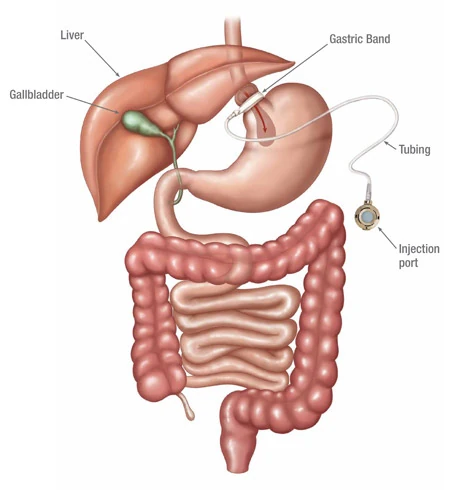Lap-Band® (Gastric Banding)
Gastric banding with Lap-Band can be an effective weight loss procedure to benefit patients with a BMI of 30 or greater.
Lap-Band® (Gastric Banding)
Gastric banding with Lap-Band can be an effective weight loss procedure to benefit patients with a BMI of 30 or greater.

What is Lap-Band Gastric Banding?
Laparoscopic gastric banding, most commonly known as Lap-Band®, is a surgical weight loss procedure in which the amount a person can eat is restricted by the size of the stomach. Dr. Darrell Doucette, our board-certified bariatric surgeon and obesity medicine specialist, offers gastric band surgery in Huntsville, Alabama.
In the procedure, Dr. Doucette will place a Lap-Band around the upper portion of the stomach, which can be adjusted (increase or decrease the tightness), to create a small section of the stomach so the patient will feel fuller faster. Unlike the gastric sleeve, the gastric band doesn’t remove any part of the stomach, instead regulating the speed of digesting food using an adjustable band.
Benefits of Lap-Band
Steady Weight Loss
Weight loss through gastric banding surgery is a gradual and consistent process, with many patients losing an
Trusted Source
Fourteen-year long-term results after gastric banding
Stroh C, Hohmann U, Schramm H, Meyer F, Manger T
Go to Source
average of 40%
of excess weight over the course of two years.
No Stapling
Gastric band surgery only restricts the stomach and does not involve rerouting or stapling your intestines.
Quicker Recovery Time
The gastric banding system is performed laparoscopically which typically results in: less scarring, narcotics and shorter hospital stays.
Adjustable
Through an outpatient procedure, the band can be adjusted to increase or decrease the size of the opening into the stomach.
Better Overall Health
Patients may experience improvement in conditions associated with obesity such as sleep apnea, high blood pressure, hypertension, joint pain and high cholesterol.
Who is Eligible for Lap-Band?
If you have a Body Mass Index (BMI) of 30 or above, you may be a candidate for Gastric Banding or another weight loss procedure.

Preparing for Lap-Band Surgery
As a patient with Alabama Surgical Associates, our team will walk you through all of the steps of preparing for your Lap-Band procedure. You will have a thorough medical examination to ensure that you are a good candidate for this bariatric surgery procedure. We will help you learn about all aspects of the Lap-Band procedure, recovery period, and the lifestyle changes that will help you overcome obesity. By the date of your surgery, you will have worked with a dietician to learn about healthy eating habits, have learned about safe and effective exercises, and emotional factors that often accompany obesity. Thanks to your relationships with members of the Alabama Surgical Associates team, you will have a strong support network to help you throughout your weight loss surgery experience.

The Lap-Band Procedure
The surgery occurs while the patient is fully anesthetized, and is performed through a minimally invasive laparoscopic technique using only small incisions. Dr. Doucette performs the procedure using a tiny video camera and specialized instruments inserted through the small incisions.
During the gastric banding procedure, the LAP-BAND® is placed around the top of the stomach, creating a small pouch above the band. The band has a small balloon attached to it which is filled with saline by the surgeon to achieve the appropriate amount of restriction. The band can be resized by the surgeon by adding or removing the saline.
Afterwards, when patients eat, the food fills the top stomach pouch created by the band, giving the feeling of fullness with less food. The food will slowly filter through the restricted opening into the rest of the stomach where it will continue to be digested normally.

Recovery After Lap-Band
Most patients go back to work within one week and resume light exercise within two weeks after Lap-Band surgery.
After surgery, the stomach will need to adjust to the band. Patients will be placed on a special diet to reintroduce solid food over the first six weeks. In order to reduce the risk of the band slipping, patients need to strictly adhere to the meal plan schedule. This allows both the stomach and patient to adjust to the small capacity of the pouch. Supplements are also required to make sure patients get all the nutrients they need.
Lap-Band Results
While results vary, patients may expect to begin losing weight in the weeks following Lap-Band surgery.
Patients typically lose
Trusted Source
Fourteen-year long-term results after gastric banding
Stroh C, Hohmann U, Schramm H, Meyer F, Manger T
Go to Source
up to 40%
of excess body weight. The amount of weight lost depends on the patient’s commitment to a new lifestyle of healthy eating and physical activity. As with any surgery there is a small risk of complications, which will be addressed by your surgeon during your consultation.
Invasiveness
Excess Weight Loss*
Rate of Weight Loss*
Average Procedure Time
Typical Hospital Stay*
Insurance Coverage Available*
Financing Available
Self Pay Cost
Gastric Balloon
Invasiveness
Excess Weight Loss*
Rate of Weight Loss*
Average Procedure Time
Typical Hospital Stay*
Insurance Coverage Available*
Financing Available
Self Pay Cost
Non-Invasive
20-40lbs
Slow
Less than 30 minutes
Out-patient
No
Yes
$5,995
ESG
Invasiveness
Excess Weight Loss*
Rate of Weight Loss*
Average Procedure Time
Typical Hospital Stay*
Insurance Coverage Available*
Financing Available
Self Pay Cost
Non-Invasive
40%
Slower
Less than 1 hour
Out-patient
Yes
Yes
$8,995
Gastric Banding
Invasiveness
Excess Weight Loss*
Rate of Weight Loss*
Average Procedure Time
Typical Hospital Stay*
Insurance Coverage Available*
Financing Available
Self Pay Cost
Minimal
40%
Slower
Less than 1 hour
Out-patient
Yes
Yes
$8,995
Gastric Sleeve
Invasiveness
Excess Weight Loss*
Rate of Weight Loss*
Average Procedure Time
Typical Hospital Stay*
Insurance Coverage Available*
Financing Available
Self Pay Cost
Minimal
40%
Slower
Less than 1 hour
Out-patient
Yes
Yes
$9,995
Gastric Bypass
Invasiveness
Excess Weight Loss*
Rate of Weight Loss*
Average Procedure Time
Typical Hospital Stay*
Insurance Coverage Available*
Financing Available
Self Pay Cost
Minimal
40%
Slower
Less than 2 hours
Out-patient
Yes
Yes
$11,995
DS/SADI-S
Invasiveness
Excess Weight Loss*
Rate of Weight Loss*
Average Procedure Time
Typical Hospital Stay*
Insurance Coverage Available*
Financing Available
Self Pay Cost
Minimal
40%
Slower
Less than 1 hour
Out-patient
Yes
Yes
*Call for Pricing
Frequently Asked Questions About Gastric Banding
What are the risks of Lap-Band?
The Lap-Band is generally considered to be a safe weight loss procedure, with more than 1,000,000 bands placed around the world in the last 25 years. Still, any surgical procedure is associated with some risks and complications. Complications of Lap-Band may include:
- Band slippage
- Band erosion
-
Trusted Source Lap-Band Patient Information ReShape Lifesciences Go to Source Food trapping
How long does Lap-Band last?
The Lap-Band is designed to remain in place for life. Your band will need to be adjusted, especially in the first year of placement, during a simple visit to our office. Lap-Band can also be adjusted for major life events like pregnancy.
Step into Wellness: Your Path to a
Lighter, Brighter Future Starts Now
Connect with Alabama Surgical Associates to take a proactive step towards your weight loss
goals. With our expert team and comprehensive approach, you’ll find the guidance and
support you need to achieve lasting results and improved well-being.
Dr. Darrell Doucette has either authored or reviewed and approved this content.
Page Updated:
1, 2 Stroh C, Hohmann U, Schramm H, Meyer F, Manger T. Fourteen-year long-term results after gastric banding. J Obes. 2011;2011:128451. doi: 10.1155/2011/128451. Epub 2010 Dec 22. PMID: 21234392; PMCID: PMC3017910. Available: https://pubmed.ncbi.nlm.nih.gov/21234392/. Accessed April 4, 2022.
3 ReShape Lifesciences. Lap-Band Patient Information. Available: https://www.lapband.com/. Accessed April 4, 2022.